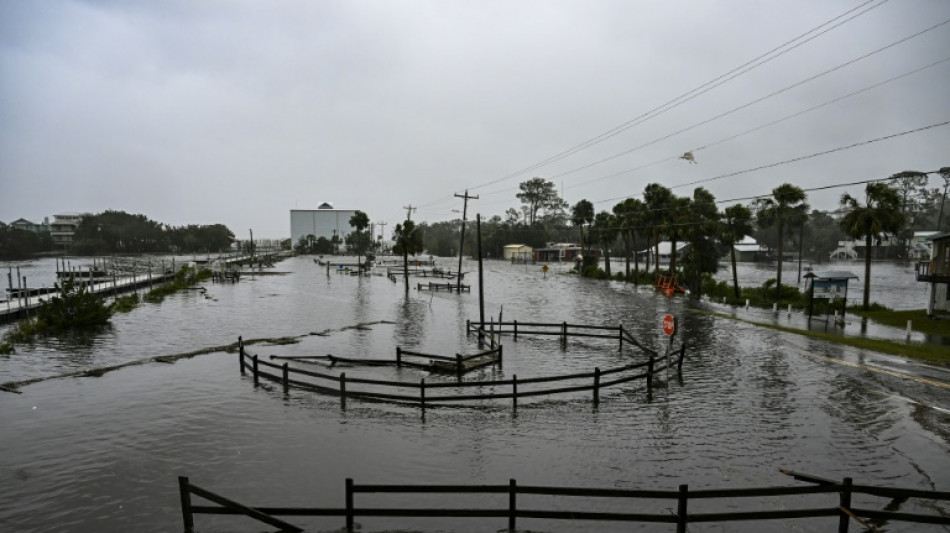

Powerful Hurricane Idalia sweeps over Florida, heads north
Hurricane Idalia slammed into northwest Florida as an "extremely dangerous" Category 3 storm early Wednesday, buffeting coastal communities with cascades of water as officials warned of "catastrophic" flooding in parts of the southern US state.
Authorities described Idalia and its potentially deadly high surging waters as a once-in-a-lifetime event for the area most affected, ordering mass evacuations.
The US National Hurricane Center (NHC) said Idalia, which earlier raked western Cuba, was packing maximum sustained winds of approximately 125 miles (215 kilometers) per hour when it made landfall around 7:45 am (1145 GMT) in Florida's marshy Big Bend area.
The NHC said the storm came ashore near the community of Keaton Beach, as an "extremely dangerous Category 3 Hurricane, and warned of a possible disastrous storm surge of up to 16 feet (about five meters) in some coastal areas.
Though Idalia lost strength as it moved inland towards Georgia, becoming a Category 1 storm, authorities warned residents of the aftermath, and the dangers of high tide.
Unlike most other coastal regions in the state, Big Bend -- a marshy area along the Gulf of Mexico -- does not have barrier islands.
The NHC said water levels were more than six feet above normal in Cedar Key, a string of islands jutting into the Gulf, and warned that waters along the coast were "rising rapidly."
Resident Shely Boivin, who manages the community's Beach Front Motel, fled before the storm's arrival, telling CNN that "everything is floating."
"Everything is flooded. I've seen pictures of the tide coming in, the water is just -- it's everywhere," she said, noting that high tide was still yet to come.
In the small coastal town of Steinhatchee about 20 miles south of Idalia's landfall, streets were mostly deserted and the main road was totally flooded.
Patrick Boland, 73, who was out for a walk surveying the damage, said: "It was a little windy, the trees were coming down in my front yard, but other than that, the house is fine."
- Inland to Georgia -
In the Tampa Bay area -- a major metropolitan zone of some three million people -- streets were submerged and flood waters swept across yards.
With the area still at low tide, Tampa Mayor Jane Castor told CNN that "the flooding that we're experiencing now is nothing compared to what we're going to see in a few hours."
Just north in the city of Tarpon Springs, people waded, or even canoed, to safety as homes and apartments were inundated.
More than 278,000 customers in Florida and 52,000 in Georgia were without electricity as of 11:30 am, according to tracking website PowerOutage.us.
US President Joe Biden was due to deliver remarks later in the day on Idalia.
The White House said the Federal Emergency Management Agency (FEMA) had prepositioned emergency personnel and resources.
- Airports, ports closed -
Florida Governor Ron DeSantis had urged residents of 23 counties along Florida's Gulf coast to evacuate and head to shelters or hotels outside the danger zones.
The US presidential candidate had warned the hurricane was on track to be the strongest to impact the region in more than a century.
Meteorologists are also pointing to a rare blue supermoon which could further raise tides above normal levels just as Idalia pounds the coastline.
Tampa International Airport and other regional airports closed, while flights were disrupted along the US East Coast as another hurricane, Franklin, churns in the Atlantic.
Several Florida ports were closed to vessel traffic as of Tuesday night, according to the US Coast Guard.
- 'Marine heat wave' -
In Cuba, the storm flooded several communities including parts of the capital Havana and knocked out power to about 200,000 people but there were no deaths reported.
The storm then moved out over the Gulf of Mexico, which scientists say is experiencing a "marine heat wave" -- energizing Idalia's winds as it raced towards Florida.
Record-breaking temperatures off the Florida coast are expected to amplify Atlantic storms this season, with scientists blaming human-caused climate change for the overall warming trend.
In July, a buoy off the state's southern tip recorded an alarming peak temperature of 101.1 degrees Fahrenheit (38.4C), a possible new world record.
Almost 150 people were killed last year when Hurricane Ian slammed Florida's west coast as a Category 4 storm, bringing ocean surges and strong winds that downed bridges and swept away buildings.
burs-bfm/sst
Q.Young--MC-UK



